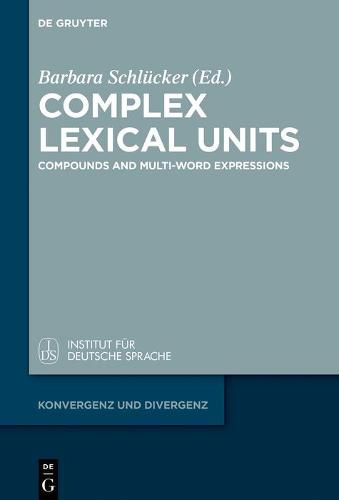Readings Newsletter
Become a Readings Member to make your shopping experience even easier.
Sign in or sign up for free!
You’re not far away from qualifying for FREE standard shipping within Australia
You’ve qualified for FREE standard shipping within Australia
The cart is loading…






This title is printed to order. This book may have been self-published. If so, we cannot guarantee the quality of the content. In the main most books will have gone through the editing process however some may not. We therefore suggest that you be aware of this before ordering this book. If in doubt check either the author or publisher’s details as we are unable to accept any returns unless they are faulty. Please contact us if you have any questions.
Both compounds and multi-word expressions are complex lexical units, made up of at least two constituents. The most basic difference is that the former are morphological objects and the latter result from syntactic processes. However, the exact demarcation between compounds and multi-word expressions differs greatly from language to language and is often a matter of debate in and across languages. Similarly debated is whether and how these two different kinds of units complement or compete with each other.
The volume presents an overview of compounds and multi-word expressions in a variety of European languages. Central questions that are discussed for each language concern the formal distinction between compounds and multi-word expressions, their formation and their status in lexicon and grammar.
The volume contains chapters on German, English, Dutch, French, Italian, Spanish, Greek, Russian, Polish, Finnish, and Hungarian as well as a contrastive overview with a focus on German. It brings together insights from word-formation theory, phraseology and theory of grammar and aims to contribute to the understanding of the lexicon, both from a language-specific and cross-linguistic perspective.
$9.00 standard shipping within Australia
FREE standard shipping within Australia for orders over $100.00
Express & International shipping calculated at checkout
This title is printed to order. This book may have been self-published. If so, we cannot guarantee the quality of the content. In the main most books will have gone through the editing process however some may not. We therefore suggest that you be aware of this before ordering this book. If in doubt check either the author or publisher’s details as we are unable to accept any returns unless they are faulty. Please contact us if you have any questions.
Both compounds and multi-word expressions are complex lexical units, made up of at least two constituents. The most basic difference is that the former are morphological objects and the latter result from syntactic processes. However, the exact demarcation between compounds and multi-word expressions differs greatly from language to language and is often a matter of debate in and across languages. Similarly debated is whether and how these two different kinds of units complement or compete with each other.
The volume presents an overview of compounds and multi-word expressions in a variety of European languages. Central questions that are discussed for each language concern the formal distinction between compounds and multi-word expressions, their formation and their status in lexicon and grammar.
The volume contains chapters on German, English, Dutch, French, Italian, Spanish, Greek, Russian, Polish, Finnish, and Hungarian as well as a contrastive overview with a focus on German. It brings together insights from word-formation theory, phraseology and theory of grammar and aims to contribute to the understanding of the lexicon, both from a language-specific and cross-linguistic perspective.